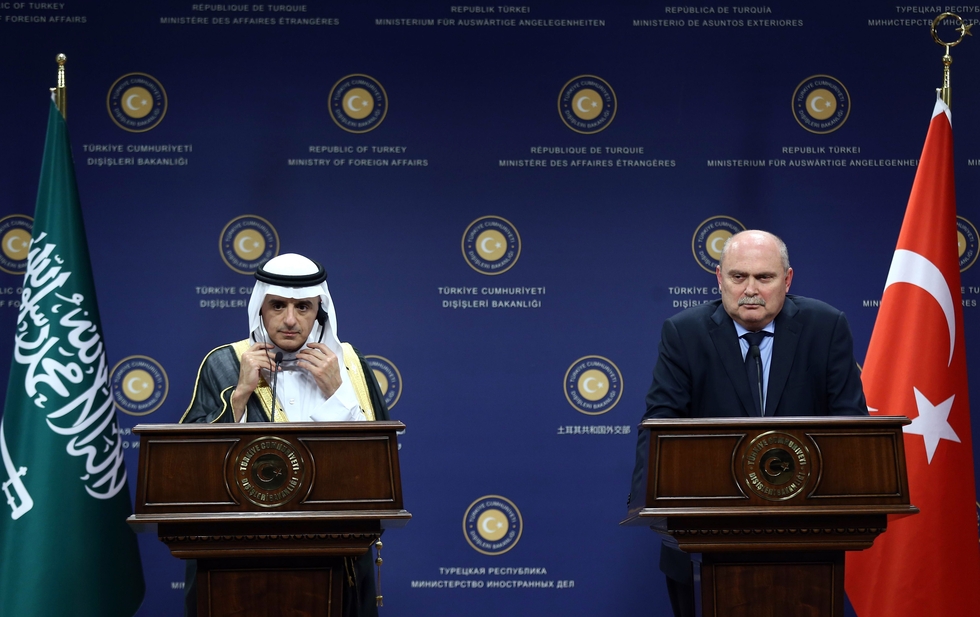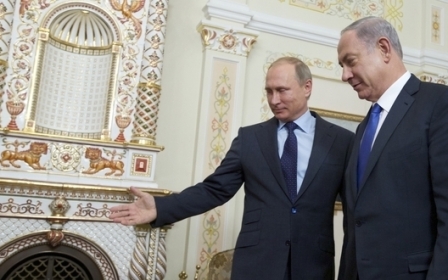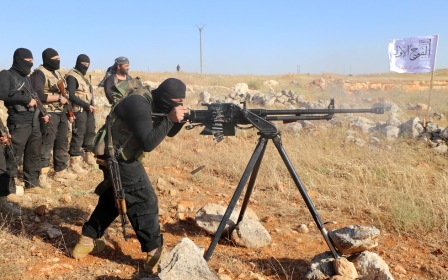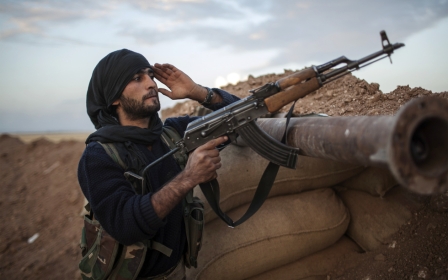Turkey, Saudi Arabia say Russia delaying Syria 'transition process'

Turkey and Saudi Arabia on Thursday accused Russia of delaying the "transition process" to peace in Syria, after Moscow launched a military campaign to support Syrian President Bashar al-Assad.
Russia says its airstrikes are primarily targeting Islamic State militants, but critics say the bulk of those raids have hit anti-Assad rebels who are also fighting IS, in addition to killing civilians.
According to the Syrian Observatory for Human Rights, the Syrian army - with Russian air support - had launched military offensives against rebels in at least four provinces since 30 September.
"Russia is making a big mistake," said Turkish Foreign Minister Feridun Sinirlioglu at a press conference in Ankara with Saudi counterpart Adel al-Jubeir.
"What it does will bring no meaning or benefit, other than delaying the transition process to help Syria out of the chaos," said Sinirlioglu, adding that "we will continue with our warnings".
Both countries reaffirmed their continued support to the Syrian opposition.
"Saudi Arabia and Turkey are in agreement on supporting the opposition in Syria. What is important is a political solution," Jubeir said.
"We are in agreement that there will certainly be no role for Bashar al-Assad," he added.
The Saudi foreign minister has also met with Turkish President Recep Tayyip Erdogan.
A rift between the Turkey and Saudi Arabia occurred following Egypt's military coup against elected president Mohamed Morsi in 2013, which Riyadh supported and Ankara opposed.
But since the ascending of Saudi King Salman to power in January 2015, Riyadh has focused its attention to what it perceives as a greater security threat from Iran, which is backing Assad in the face of an uprising against his rule.
The Syrian conflict began in March 2011 with peaceful mass pro-reform protests inspired by the Arab Spring, but following a bloody government crackdown on dissent, it has morphed into a civil war where around 250,000 have been killed and millions were displaced.
Russia, Assad are indirectly aiding IS
Critics of Moscow's military escalation say the Russian raids are hurting Syrian rebels who are fighting IS, thus giving the militants an upper hand.
"Russian planes are striking the Free Syrian Army and laying the groundwork for Daesh [Islamic State] control of strategic areas in Aleppo," a source from Tajammu al-Izzah Syrian rebel group, told the British daily The Guardian.
Such criticism echoes previous claims that Assad is indirectly aiding the Islamic State by bombing rebels while they fight IS militants.
And a recent report by the Financial Times went as far as to suggest that pro-Assad forces and IS militants have strong cooperation over the gas that generates Syria's electricity.
Clashes between the two sides, the FT report added, are predominately over securing greater control of energy and not an attempt to exterminate each other.
"Think of it as tactical manoeuvres to improve leverage," an owner of one Syrian energy company, told the FT, comparing the Assad-IS deals to 1920s Chicago mafia negotiation: "You kill and fight to influence the deal, but the deal doesn’t end."
Turkish-Saudi-Qatari support for Syrian rebels
Meanwhile separately, French President Francois Hollande said on Friday that Russia's military intervention in Syria "can bolster the (Assad) regime but will not save Bashar".
Last week, Saudi Defence Minister Crown Prince Mohammed bin Salman met with Russian President Vladimir Putin and Russian Foreign Minister Sergey Lavrov in Moscow to discuss the Syrian crisis, but the talks concluded with a diplomatic tone.
"The sides confirmed that Saudi Arabia and Russia have similar goals concerning Syria," said Lavrov.
These goals are the prevention of "a terrorist caliphate from getting the upper hand in Syria," and "ensuring the triumph of national reconciliation in Syria so that all Syrians, regardless of their nationality or religion, will feel masters of their land," added Lavrov.
Despite this, however, both Riyadh and Moscow would continue supporting opposing sides in Syria, although it is not entirely clear which Syrian rebel groups Saudi Arabia is aiding.
Former Saudi intelligence chief, Prince Turki bin Faisal Al Saud, recently told Sky News Arabia that Riyadh, as far as he's aware, is backing the Free Syrian Army (FSA) rebel group.
However, Jamal Khashoggi, an informed Saudi columnist and general manager of Alarab satellite TV, said that Riyadh – which is against both Assad and IS - supports any effective Syrian rebel force, with the exception of the al-Qaeda affiliate Al-Nusra Front.
Despite the increased Russian military backing for Assad, and with a lack of real US military aid for Syrian rebels, Saudi Arabia – along with Qatar and Turkey – will "remain committed to their support for the Syrian revolution," Khashoggi told Al Ghad Al Arabi satellite TV station.
Kurdish militancy
Ankara's irritation with Moscow is also over alleged Russian military support for Syrian Kurdish militiamen, who are linked to Turkey's Kurdistan Workers Party (PKK), which is categorised as a terrorist organisation by a number of countries.
Ankara fears that the alleged arms supply to the Democratic Unity Party (PYD) in Syria, whose armed wing is fighting IS militants with backing from US airstrikes and FSA rebels, would reach the PKK militants, which has recently resumed attacks against the Turkish state.
Turkey had summoned the Russian and US envoys this week to warn against giving military support to PYD – a charge denied by Moscow.
"Our message to the Americans, all allies and Russia is very clear: We will not hesitate even a moment [to respond] if the weapons aid to PYD so close to Turkish border becomes a threat to Turkey in any way and PYD begins to harm Turkey via infiltrations like the PKK or weapons transfer," Turkish Prime Minister Ahmet Davutoglu said on Tuesday.
"At a time when the PYD is so nested with the PKK, which is attacking Turkey, nobody can justify the weapons given to PYD by a friend and ally, or a neighbour country like Russia," he added.
"No one can guarantee that arms sent to the PYD today will not later be used by the PKK," said Davutoglu. "Turkey will not tolerate arms aid to groups linked to the PKK."
PYD leader Salih Muslim has denied intending to attack Turkey, but added that the Syrian Kurdish militiamen would "defend" themselves in case of a Turkish attack, according to Firat News Agency.
The Turkish foreign minister responded by warning that "any action against Turkey will be punished without any hesitation," while "inviting Salih Muslim to come to his senses."
Middle East Eye propose une couverture et une analyse indépendantes et incomparables du Moyen-Orient, de l’Afrique du Nord et d’autres régions du monde. Pour en savoir plus sur la reprise de ce contenu et les frais qui s’appliquent, veuillez remplir ce formulaire [en anglais]. Pour en savoir plus sur MEE, cliquez ici [en anglais].




